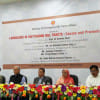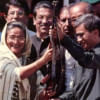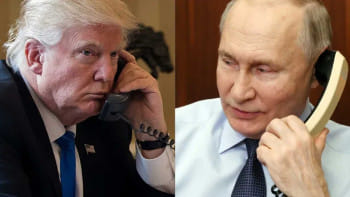Implementing CHT Accord: Will the government listen to the UN call?

The 22nd session of the United Nations Permanent Forum on Indigenous Issues (PFII) was held on April 17-28, 2023, at the UN headquarters in New York. During this session, the PFII called upon the Bangladesh government to make further efforts towards the full implementation of the Chittagong Hill Tracts (CHT) Accord. It also welcomed the progress made so far to implement the accord.
Based on a press statement from the Permanent Mission of Bangladesh to the UN, The Daily Star (alongside other media outlets) published a news report on this issue on April 30. In this context, CHT Development Board Chairman Nikhil Kumar Chakma posted partial information on Facebook, only stating that the government's efforts to implement the CHT Peace Accord has been welcomed at the PFII.
But Mr Chakma seems to have carefully sidestepped the PFII's call for Bangladesh to "make further efforts towards the full implementation of the CHT agreement." By sharing only a fragment of the PFII's message, he tried to convey to the countrymen that the UN is satisfied with Bangladesh's progress in implementing the CHT Accord.
At the PFII session, the Bangladesh government delegation highlighted that this year, 40 projects have been implemented for the CHT region's development, and 1,555 more projects have been approved. But how sustainable will the development plan be for the Indigenous Jumma people? Will the Jumma villagers lose their land, be evicted from their ancestral land and homesteads, be deprived of their right to self-governance as well as self-determination of development priorities, as per the CHT Accord? Will the biodiversity, environment and water resources of the region be protected, or will the Jumma people be deprived of their traditional farming and livelihoods?
According to what the government delegates told the UN forum, 65 clauses out of the 72 in the CHT Accord have been fully implemented, three clauses have been partially implemented, and only four remain unimplemented. If that were true, then why is the special governance system and the overall situation in the CHT region still as fragile as the pre-Accord period? On the 25th anniversary of the signing of the treaty last year, the government presented information about the full implementation of 48 clauses, so it is really surprising how another 17 clauses got fully implemented over the last five months.
If what the government delegation said at the PFII session is true – that 65 clauses out of 72 are fully implemented – why are the characteristics of tribal-inhabited areas in the CHT, as recognised in Clause 1 of Part A of the accord, slowly deteriorating? Why are the laws, rules, and regulations applicable in the CHT, including the CHT Regulations, 1900, not amended in line with the CHT Accord, which was stipulated in Clause 2 of Part A? Why has the settlement of the case filed with the High Court against the CHT Accord been pending for so many years?
It is not possible to resolve the CHT issue by suppressing and spreading false propaganda at home and abroad. The only way to resolve it is politically and peacefully through the proper, speedy and full implementation of the CHT Accord. By doing this, there is no doubt that the sovereignty and integrity of Bangladesh will be stronger, as mentioned in the preface of the CHT Accord.
The elections to the three hill district councils, as stipulated in Part B of the accord, has not been held over the past 25 years. The voters' list with the permanent residents of the three hill districts has not yet been made either, which is also stipulated in the accord. Even the electoral roll rules and election rules for the hill district councils have not been formulated. Furthermore, law and order, police, land and land management, forest and environment, development of a communication system, etc have not been handed over to the hill district councils. The hill district police force has not been formed. Despite the decision of the Accord Implementation Committee, the jurisdiction to issue Permanent Resident Certificates, vested upon the deputy commissioners in violation of the accord, has not been abrogated.
And if only four clauses of the accord remain unimplemented and three partially unimplemented, why is the process of coordination and supervision of the CHT Regional Council over the general administration, law and order, and development of the three hill districts not being executed as per the provisions inserted in Part C of the accord? Why has the process of overall supervision and coordination of the matters entrusted to the three hill district councils – including all development activities by the regional council – not been introduced? Why is the CHT Development Board not performing its duties under the general and overall supervision of the Regional Council?
On the other hand, the India-returned Jumma refugees have not yet gotten their land back, violating Clause 1 of Part D of the accord. The internally displaced tribal families (IDPs) were not rehabilitated on their own land either. One of the main problems in the CHT is the land problem. If 65 clauses of the accord have been fully implemented, why hasn't a single land dispute been resolved over the last 25 years? Why are the Jumma people constantly losing their land and being evicted from their homesteads? Why is the land lease given to non-locals cancelled? Why has two acres of land not been allocated to the landless Jumma families? Why are there more than 400 temporary camps and "Operation Uttaran" in the CHT still? Why are the innocent Jumma people constantly being subjected to arrest, jail, oppression, house searches, extrajudicial killings?
Can the government delegation answer these questions?
The main question here is: will the government step forward to implement the CHT Accord hearing the call from the Permanent Forum on Indigenous Issues? Already, at its 10th session in 2011, the PFII made recommendations regarding the implementation of the CHT Accord. In August 2022, the UN high commissioner for human rights also called on the Bangladesh government to implement the accord and allow independent actors unrestricted access to the CHT region. On December 2, the UN special rapporteur on the rights of Indigenous peoples also highlighted the overall situation in the CHT region due to non-implementation of the accord, and strongly called upon the government for proper and full implementation of the treaty. The UN specialised agency ILO and the Universal Periodic Review (UPR) of the Human Rights Council have also urged the government for the full implementation of the CHT Accord. But the government remains ignorant to all these calls.
It must be mentioned that there is no room to think that the deluge will stop if the government continues to ignore international calls for CHT Accord implementation. The Jumma people are being oppressed in the country, and attempts have been made to suppress the voices of Jumma rights activists through surveillance and intimidation at international platforms like the United Nations.
It is not possible to resolve the CHT issue by suppressing and spreading false propaganda at home and abroad. The only way to resolve it is politically and peacefully through the proper, speedy and full implementation of the CHT Accord. By doing this, there is no doubt that the sovereignty and integrity of Bangladesh will be stronger, as mentioned in the preface of the CHT Accord.
Mangal Kumar Chakma is information and publicity secretary at the Parbatya Chattagram Jana Samhati Samiti (PCJSS).

 For all latest news, follow The Daily Star's Google News channel.
For all latest news, follow The Daily Star's Google News channel. 










Comments